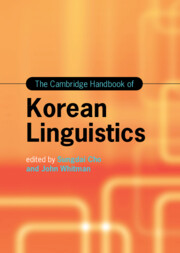Book contents
- The Cambridge Handbook of Korean Linguistics
- Cambridge Handbooks in Language and Linguistics
- The Cambridge Handbook of Korean Linguistics
- Copyright page
- Contents
- Figures
- Tables
- Contributors
- Preface
- Acknowledgments
- Abbreviations
- Part I Korean Overview
- Part II Phonetics and Phonology
- Part III Morphology and Syntax
- Part IV Semantics and Pragmatics
- Part V Sociolinguistics and Psycholinguistics
- Part VI Language Pedagogy
- Chapter 26 The Genre-Based Approach to Korean Language Teaching: A Curriculum Application
- Chapter 27 Towards Integrated Performance Assessment
- Chapter 28 Interactional Competence in the Korean Language
- Chapter 29 From Bilingual Speakers to Korean Heritage Language Learners
- Chapter 30 Language Policy and Its Effect in South Korea
- Index
- References
Chapter 28 - Interactional Competence in the Korean Language
from Part VI - Language Pedagogy
Published online by Cambridge University Press: 30 September 2022
- The Cambridge Handbook of Korean Linguistics
- Cambridge Handbooks in Language and Linguistics
- The Cambridge Handbook of Korean Linguistics
- Copyright page
- Contents
- Figures
- Tables
- Contributors
- Preface
- Acknowledgments
- Abbreviations
- Part I Korean Overview
- Part II Phonetics and Phonology
- Part III Morphology and Syntax
- Part IV Semantics and Pragmatics
- Part V Sociolinguistics and Psycholinguistics
- Part VI Language Pedagogy
- Chapter 26 The Genre-Based Approach to Korean Language Teaching: A Curriculum Application
- Chapter 27 Towards Integrated Performance Assessment
- Chapter 28 Interactional Competence in the Korean Language
- Chapter 29 From Bilingual Speakers to Korean Heritage Language Learners
- Chapter 30 Language Policy and Its Effect in South Korea
- Index
- References
Summary
Chapter 28 draws on findings from conversation analysis, pragmatics, and interactional linguistics studies of Korean language, to offer an overview of L1 Korean speakers’ routinized procedures and practices for turn-taking and repair organization, both of which are tied to the grammatical structures and pragmatic features of Korean. The discussion of each practice touches on pedagogical implications for L2 contexts, drawing on a number of recent empirical studies that have documented L2 interactional development processes.
Keywords
- Type
- Chapter
- Information
- The Cambridge Handbook of Korean Linguistics , pp. 800 - 831Publisher: Cambridge University PressPrint publication year: 2022

